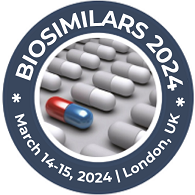Call for Abstract
Scientific Program
17th International Conference on Biosimilars and Pharmaceuticals, will be organized around the theme “Future Prospects and Advancements of Biosimilars and Pharmaceuticals”
BIOSIMILARS 2024 is comprised of keynote and speakers sessions on latest cutting edge research designed to offer comprehensive global discussions that address current issues in BIOSIMILARS 2024
Submit your abstract to any of the mentioned tracks.
Register now for the conference by choosing an appropriate package suitable to you.
Biosimilars are biological products that are highly similar to an already approved biologic reference product, known as the originator or reference biologic. Biosimilars are developed to be comparable in terms of safety, efficacy, and quality to the reference product. To gain approval, biosimilars undergo a comprehensive comparability exercise, which includes extensive analytical studies and clinical trials, to demonstrate that they are highly similar to the reference biologic.
Biologics are a class of medicinal products derived from living organisms or their components. They are produced using advanced biotechnology techniques and are typically large and complex molecules, such as proteins, antibodies, or nucleic acids. Biologics are used to treat various diseases, including autoimmune disorders, cancer, and chronic diseases like diabetes. Unlike traditional small molecule drugs, which are chemically synthesized, biologics are manufactured using living cells or organisms, such as bacteria or yeast.
Biopharmaceuticals also known as biologic drugs or biologics, are pharmaceutical products derived from biological sources, such as living cells or organisms. They are produced using biotechnology techniques and typically consist of large, complex molecules, such as proteins, peptides, antibodies, nucleic acids, or living microorganisms.
Biopharmaceuticals have revolutionized the field of medicine by offering innovative treatment options for various diseases, including cancer, autoimmune disorders, hormonal imbalances, genetic diseases, and more. They are designed to target specific molecules or pathways involved in disease processes, providing highly targeted and personalized therapies
Bioequivalence assessment is a crucial step in the evaluation of generic drugs or biosimilar products. It compares the pharmacokinetic and sometimes pharmacodynamic properties of a generic/biosimilar drug to that of a reference drug (innovator drug) to determine if they are equivalent in terms of safety and efficacy.
The purpose of bioequivalence assessment is to demonstrate that the generic or biosimilar product is highly similar to the reference product, showing comparable bioavailability and similar therapeutic effects. It is based on the principle that if two products are bioequivalent, they can be expected to have the same therapeutic outcome when administered to patients at the same dosage
Biosimilars are biological products that are highly similar to an already approved reference biologic, known as the originator or reference product. Biosimilars are developed to have a comparable quality, safety, and efficacy profile to the reference product.
Here are some key points about biosimilars:
Regulatory Approval: Biosimilars undergo a rigorous regulatory approval process to demonstrate their similarity to the reference product. The specific requirements for approval may vary across countries, but they generally involve extensive analytical and clinical studies to establish biosimilarity.
Similarity not Identical: Biosimilars are not identical copies of the reference product but are highly similar in terms of quality attributes, biological activity, and clinical performance. Minor differences may exist due to the inherent complexity of biologics and the manufacturing process, but these differences are not clinically meaningful.
It's important to note that healthcare providers play a critical role in the appropriate use of biosimilars. They need to be informed about the availability, regulatory approvals, and clinical evidence surrounding biosimilars to make informed decisions in the best interest of their patients.
Overall, biosimilars contribute to increasing patient access to biologic therapies, offering more affordable options while maintaining comparable safety and efficacy to the reference product. They provide an important avenue for expanding treatment options and promoting sustainable healthcare systems.
Biosimilar Interchangeability" refers to the ability of a biosimilar product to be substituted for the reference biologic product without any negative impact on safety or efficacy. This is a critical concept in the field of biopharmaceuticals and regulatory agencies around the world have established guidelines and criteria to determine whether a biosimilar can be considered interchangeable with its reference product. Here's some content about biosimilar interchangeability
Pediatric clinical trials for biosimilars are a vital component of the pharmaceutical research landscape. These trials are designed to evaluate the safety, efficacy, and dosing of biosimilar medications specifically for children. Ensuring that biosimilars are safe and effective for pediatric patients is crucial, as it allows healthcare providers to offer more treatment options and potentially reduce the cost of care. In this article, we'll explore the significance of pediatric clinical trials for biosimilars and their impact on children's healthcare.

